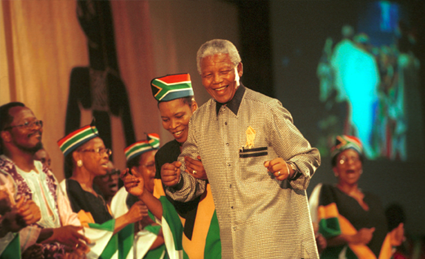
Methodist leaders pay tribute to Nelson Mandela

By Linda Bloom*
As the world learned of the passing of Nelson Mandela, United Methodists and other faith leaders offered tributes to the revered South African leader.
The statesman, who died Dec. 5 at the age of 95, had many connections to Methodismthroughout his life and also publicly acknowledged the contribution of religious leaders in the struggle against apartheid.His widow, Graça Machel, is a United Methodist from Mozambique.
Mandela visited the World Council of Churches in Geneva in 1990, soon after his release from prison, and addressed the WCC’s 8th Assembly in Harare, Zimbabwe, in 1998 when he was South Africa’s president.
“He will be recalled as the leader who acted to unify a nation once deliberately divided along the lines of race,” said the Rev. Olav Fykse Tveit, the WCC’s top executive, on Thursday.
Remembering visit with the council of bishops
United Methodist Bishops Rosemarie Wenner of Germany and Sally Dyck of Chicago recalled when Mandela and Machel visited a meeting of the United Methodist Council of Bishops in Mozambique in 2006.
“What a moment!” Wenner said. “We committed ourselves to follow the example of this fellow Christian, even though none of us dared compare our struggles.”
“Nelson Mandela brought faith into action,” she added. “Even 27 years in prison could not hinder him in staying firm in believing that all God’s people are called to live with one another in peace and dignity, no matter the color of their skin.”
In her Dec. 5 blog titled “When Nelson Mandela came to dinner,” Dyck remembered Mandela speaking briefly to the bishops after remarks from his wife, reshaping an old joke about getting into heaven to reflect his personal journey.
“It was an appropriated joke but in it was a message that I have since cherished,” she wrote. “No matter where we find ourselves — even in the hells of injustice, prison, oppression — we can do something to organize it to become a place of justice, freedom and peace.”
Washington Area Bishop Marcus Matthews said he was struck at that meeting by “the fact that Mandela did not seem to have a bone of hatred in his body, despite what he had undergone during the 27 years he was imprisoned for speaking out for the rights of the people. This world is indeed a better place because God shared Mandela with us.”
While offering prayers for Mandela’s family and the people of South Africa, Matthews also encouraged “all of our churches to tell the story of Nelson Mandela to our children. In Sunday School classes, children’s sermons and youth groups, share the message of Mandela and the profound and humble role he played on the world stage.” (Read Bishop Matthews full statement here.)
Salute by World Methodist Council
In an article about Mandela’s passing on its website, the World Methodist Council remembered the South African leader “as a person who fought for dignity and equality for all, not through the barrel of a gun but instead through the moral authority that comes when the cause of justice is on one’s side.
“The lives that were touched by Maniba’s words and deeds are impossible to count, but his story will live on for generations to come as an example of how to lead in the face of oppression. Mandela was a man of faith, principle, hope and inspiration. The leader of a movement and the father of a nation, Mandela’s shadow will stretch forward as a reminder to each of us of a better way.”
The Rev. H. Eddie Fox, the council’s world director of World Methodist Evangelism, happened to be in South Africa visiting Methodist Bishop Mvume Dandala when Mandela was released from prison in 1990.
“In the following days, we were at Soweto stadium when he spoke the first time to the peopIe of his country,” he recalled.
In 1998, Fox was able to present then-President Mandela with a Waterford crystal globe of the world — symbolizing the highest award from World Methodist Evangelism, “World Ambassador of the Good News,” — during a meeting of the Methodist Church of Southern Africa.
“In 2000, we were privileged to be present with Nelson Mandela as he received the World Methodist Council Peace Award in a special ceremony in Cape Town,” Fox said. “Gracious and strong as always, we celebrated his victory and his faithfulness for peace.
“That evening when we walked outside to his car, people gathered to see their president. Some children stood on the side of the street. He lowered his glass and motioned for the children to come to him. He embraced them and expressed his love for them. He is ‘Madiba’ to all his people and indeed the Father of his country.”
Willing to pay the price
The Rev. John McCullough, a United Methodist pastor and president of Church World Service, pointed out that Mandela was willing to pay the price of a long imprisonment “so that all South Africans could be free and share equally in the benefits of citizenship. It was this unselfish conviction and inexhaustible commitment that inspired people around the world — including the ecumenical community — to join his cause.
“Church World Service, like others, was proud to stand with Mandela in support of justice, fairness and dignity,” McCullough wrote in a remembrance.“Despite the many personal attacks against him, we remained resolute in our conviction that Mandela be freed and the apartheid system dismantled so that South Africa could be free.”
*Bloom is a United Methodist News Service multimedia reporter based in New York.

Login/Register to leave comment